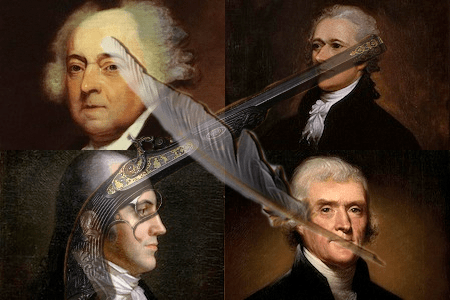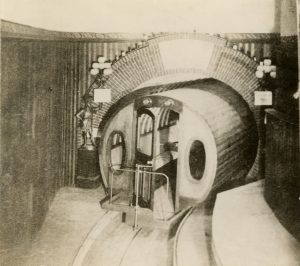After watching the current events of this 2016 election, the American people can agree as a whole that this Presidential race has been significantly different than ones we have seen before. The two candidates take and give personal blows to each other, and the electorate watches as what seems as the most personal election in recent history. With careful consideration of previous American Presidential Elections, one might be reminded of another election just as personal, maybe even more so, than our current one. The Election of 1800, or as Thomas Jefferson put it: the “Revolution of 1800.”1
This gruesome election was between Federalist and incumbent John Adams with his running mate Charles C. Pinckney and Democratic-Republican and principal author of the Declaration of Independence Thomas Jefferson with his running mate Aaron Burr. In this story we have an interesting cast of characters, all of which are very prominent figures in the history of the early Republic. The men involved had intricate personal relationships that acted as a catalyst in the crucible that would become the Election of 1800.
All men involved came from some form of political or military merit. John Adams was a prominent voice in declaring America’s Independence. Thomas Jefferson had been the United States Minister to France (he had spent a majority of the war and its aftermath in France). Aaron Burr had been a colonel in the Continental Army. Most of the men were quite fond of each other due to the fact that they had worked with each other before, although all had one thing in common: their distaste for Alexander Hamilton, Chief de Aide for General George Washington during the Revolutionary War and Senior Officer in the Continental Army. Hamilton was a stubborn man. Years before the election Hamilton had attempted to destroy Adams in his Adams’ Pamphlet, 2. He continuously bashed heads with Jefferson, while both he and Jefferson served in George Washington’s Presidential Cabinet in the early 1790s; and Hamilton was very vocal in his distaste of Aaron Burr.

At the beginning of the race, much of the American population was not too fond of President Adams’s Administration. With the implementation of the highly unpopular Alien and Sedition Acts, which was an act of law signed by Adams himself in 1798 that allowed the deportation of foreigners, the Federalist party itself seemed to fall apart. Only some truly supported Adams. With the relative unity of the Democratic-Republican Party and the particular favoritism of Jefferson in the South and Aaron Burr in New York, the Federalists feared that their opponents would win the presidency. In November of 1800 the election began, and as the ballots came in, the results only surprised a few. Adams received sixty-five votes while Jefferson received seventy-three. The election seemed to have been won, but something went wrong. The members of the electoral college failed to hold back one of their votes for Burr, which caused a vote count tie of seventy-three votes for each Jefferson and Burr, and thus propelled the two into a one on one race for presidency. 3
Alexander Hamilton, seeing both of his enemies with the potential to become president, felt himself in a sticky situation. Adams seeing this, laughed at Hamilton, saying,“The very man—the very two men—of all the world that he was most jealous of are now placed above him.”4 Hamilton had to put his pride aside and place his support behind one of these men for the betterment of the country.
Aaron Burr, being Jefferson’s running mate, was also put in an uncomfortable situation. He came into the race as just a Vice Presidential candidate; now he had to go against Jefferson for the presidential seat. Most people believed that Burr should just give Jefferson the position, even if Burr might have won by a landslide in the coming vote in the House, where the tie would be decided. This was not Burr’s intention. After being Jefferson’s running mate in the previous election, the Election of 1796, Burr had been left with a bitter taste in his mouth after Jefferson himself won the Vice Presidency and left him with nothing in fourth place. Burr even went so far as to say “As to my Jeff, what happened at the last election (Et tu Brute!).” 5 Burr was in it to win it.

Now that Adams, the Federalist Presidential Nominee, was out of the picture, the Federalists were in a scattered frenzy over whom they should pick: Jefferson or Burr. Most contemplated giving their votes to Burr due to the fact that most Federalists saw Jefferson as unfit to run for such an office, or as Robert G. Harper, a Federalist, put it: Jefferson was possibly able to be “a professor in a college or a president of a philosophy society,” but definitely not the head of our nation. 6 Others that were in favor of Jefferson were known to be quite violent in their advocacy, some even stating that if Burr were elected in place of Jefferson “we will march and dethrone him as an usurper.” 7
Finally, in February of 1801, the voting went to the House of Representatives. All sixteen states were allowed a single vote, and the winner only needed a majority of nine votes. The voting went on for five days. Tensions rose, state militas threatened to rise if a president was not elected. The House went through thirty-five votes, and each time they reached the same result: a tie. Then men grew restless and began to seek out an easy way out, and this is when Hamilton seized any opportunity he could to write to each of his Federalists colleagues in the electoral college to either withdraw their vote or place it for Jefferson.
James A. Bayard, a Federalist from Delaware, began to listen to Hamilton’s plea. For all thirty-five previous votes, Bayard had voted for Burr, but after reading Hamilton’s letters, Bayard began to weaken his support for Burr. Finally on the thirty-sixth vote, Bayard inserted a blank vote and abstained Delaware’s vote. At the same time two other representatives gave in as well and also withdrew their votes, allowing Jefferson to win ten votes, and thus win the presidency.
The general confusion of the Election of 1800 led the next Congress to pass the Twelfth Amendment, which revised the way the electoral college elected the President and Vice President. In addition to the passing of the Twelfth Amendment, personal feuds came to fruition after Burr’s lost. Burr believed Hamilton was the greatest impediment in his path for success and challenged him to a duel. In 1804, both left to New Jersey and Burr shot down Hamilton.
- Alan Brinkley, American History: Connecting with the Past. Volume 1: to 1865 (New York: McGraw-Hill Education, 2015), 177. ↵
- Ron Chernow, Alexander Hamilton (New York : Penguin Press, 2004), 619. ↵
- Brinkley, American History: Connecting with the Past, 178. ↵
- Chernow, Alexander Hamilton, 632. ↵
- Chernow, Alexander Hamilton, 634. ↵
- Chernow, Alexander Hamilton, 634. ↵
- Chernow, Alexander Hamilton, 635. ↵



84 comments
Tina Valdez
Hamilton’s letters I was unaware played such a prominent role in Jefferson winning the presidency. The passing of the twelfth amendment was onset by this interesting election which, after reading the article, I can understand. Your article was very well written and incredibly informative, there was a great deal of information, however it was well put together.
Joshua Tinajero
It is interesting to read about how politics hasn’t changed that much in the sense that people act in disgraceful ways in order to discredit their political opponents. Just as the election of 1800, this current election will definitely be one to remember for a very long time.
Mariana Sandoval
This was a really well-researched article! I think it’s interesting that the electoral college was modified after this election. It would be interesting to see if maybe after this election the electoral college would be modified again…
Esperanza Mauricio
Knowing that the electoral college was changed into the one we fairly know today is pretty interesting. Seeing as the electoral college has caused so many disputes with the popular vote and electoral votes. They put it in place because of the confusion during the election and yet the electoral college still causes confusion.
Maalik Stansbury
I love how you explained how the world has progressed or kind of degressed really when it comes to the presidential candidates and the election. Expressing the amount of thought put into an election and campaign versus this madness on TV.
Mehmet Samuk
I do not really remember but I think I have heard something that is related to 1800’s elections and today’s elections. Your introduction took my attention directly. I did not have any background information about the elections in 1800 before reading your article. You did a great job for explaining what kind of election was it and illustrated the profound effects of it on the U.S government. Good Job !!
Jezel Luna
I had no background knowledge on the election of 1800 but you did an exceptional job explaining every detail. You did a fantastic job summarizing the election and being able to relate it to the present tense. I would’ve loved to hear more about the dual between Burr and Hamilton. Otherwise, great descriptive article!
Rachel White
Very well written and attention grabbing first paragraph. I knew very little about this election before reading this article and found it quite humorous that the electoral college failed to vote correctly and I didn’t realize how uncomfortable Burr must have been running against Jefferson after being by his side in the previous election. Great detail and I enjoyed reading your article.
Soki Salazar
The introduction absolutely captured my attention. I love how you compared the Election of 1800 to the one of today, for they are both very personal which in a way makes it a bit more brutal. I did not know much about this election, but this article gave me insight on the election. I did not know that Hamilton disliked Jefferson although they both had opposing views when it came to the type of government we should have, but it was interesting to see that he supported him for the election.
Diana Moreno-Gutierrez
Great topic and is very relevant to this coming elections. As I see these two presidents did a lot of mudslinging without having any type of boundaries. I find it quite interesting how a grown man like Burr, couldn’t stand the thought of loosing. Overall, the article did a great job at summarizing and explaining the election that is still famously known today.